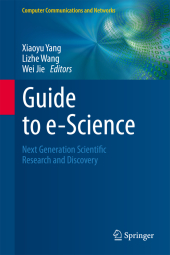 Neuerscheinungen 2013Stand: 2020-01-07 |
Schnellsuche
ISBN/Stichwort/Autor
|
Herderstraße 10
10625 Berlin
Tel.: 030 315 714 16
Fax 030 315 714 14
info@buchspektrum.de |

Wei Jie, Lizhe Wang, Xiaoyu Yang
(Beteiligte)
Guide to e-Science
Next Generation Scientific Research and Discovery
Herausgegeben von Yang, Xiaoyu; Wang, Lizhe; Jie, Wei
2013. xxviii, 540 S. 222 SW-Abb. 235 mm
Verlag/Jahr: SPRINGER, BERLIN 2013
ISBN: 1-447-12658-0 (1447126580)
Neue ISBN: 978-1-447-12658-4 (9781447126584)
Preis und Lieferzeit: Bitte klicken
Using real-world examples, this book shows how computational technologies and tools can be used to build essential infrastructures supporting next-generation scientific research. Covers security, privacy, collaboration, automated workflow technology and more.
This guidebook on e-science presents real-world examples of practices and applications, demonstrating how a range of computational technologies and tools can be employed to build essential infrastructures supporting next-generation scientific research. Each chapter provides introductory material on core concepts and principles, as well as descriptions and discussions of relevant e-science methodologies, architectures, tools, systems, services and frameworks. Features: includes contributions from an international selection of preeminent e-science experts and practitioners; discusses use of mainstream grid computing and peer-to-peer grid technology for "open" research and resource sharing in scientific research; presents varied methods for data management in data-intensive research; investigates issues of e-infrastructure interoperability, security, trust and privacy for collaborative research; examines workflow technology for the automation of scientific processes; describes applications of e-science.
Part I: Sharing and Open Research
Implementing a Grid / Cloud e-Science Infrastructure for Hydrological Sciences
The German Grid Initiative: Current State and Future Perspectives
Democratizing Resource-Intensive e-Science Through Peer-to-Peer Grid Computing
Peer4Peer: E-science Communities for Overlay Network and Grid Computing Research
Part II: Data-Intensive e-Science
A Multi-Disciplinary, Model-Driven, Distributed Science Data System Architecture
An Integrated Ontology Management and Data Sharing Framework for Large-Scale Cyberinfrastructure
Part III: Collaborative Research
An e-Science Cyberinfrastructure for Solar-enabled Water Production and Recycling
e-Science Infrastructure Interoperability Guide: The Seven Steps Towards Interoperability for e-Science
Trustworthy Distributed Systems Through Integrity-Reporting
An Intrusion Diagnosis Perspective on Cloud Computing
Part IV: Research Automation, Reusability, Reproducibility and Repeatability
Conventional Workflow Technology for Scientific Simulation
Facilitating E-Science Discovery Using Scientific Workflows on the Grid
Concepts and Algorithms of Mapping Grid-Based Workflows to Resources Within an SLA Context
Orchestrating e-Science with the Workflow Paradigm: Task-Based Scientific Workflow Modelling and Performing
Part V: e-Science: Easy Science
Face Recognition using Global and Local Salient Features
OGSA-Based SOA for Collaborative Cancer Research: System Modelling and Generation
e-Science: The Way Leading to Modernization of Sciences and Technologies


